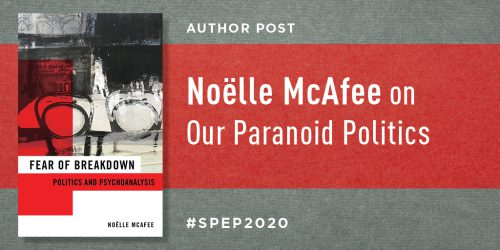Political Philosophy and Real Politics: Part II of an interview with Albena Azmanova, author of “The Scandal of Reason”
“Preoccupation with economic redistribution, gender equality, cultural diversity, and action against sexual harassment appeared all too smug to me when set against the evils of life under political oppression and bankrupt economic systems”
– Albena Azmanova
Albena Azmanova is the author of The Scandal of Reason: A Critical Theory of Political Judgment. This post is the second of a three-part series in which Professor Azmanova discusses The Scandal of Reason, theories of political judgment, and ways in which political philosophy can become more helpful in the actual political process. Today, she addresses how her personal background influenced the writing of her book.
The story of The Scandal of Reason goes back in a straight line, and a long one at that, to my revolutionary past of twenty years ago. Quite unawares, and certainly without the armament of a grand doctrine, I became involved with the dissident movements in the late 1990s in my native Bulgaria as a first-year student at Sofia University. I recall distinctly that what drove us to act was a sense of frustration, and although I ended up writing up the demands of the students—whose strike triggered the downfall of the regime—I did so not because we had a creed, but because a television reporter asked after our goals and we had to come up with something on the spot. When I spoke later on behalf of the students at the Council of Europe, I was bewildered that telling of our frustration seemed not to be enough. Instead, I was pressed to specify positive goals, to name the tenets of our movement. To this day I find it a great pity that instead of trying to understand the proper causes of our frustration, we rushed into formulating (and simply borrowing) grand plans for a new future. A precious opportunity was missed in this way. The construction of (some semblance of) liberal democracies in post-communist Eastern Europe was in no way a response to the specific grievances that had prompted us to reject the old order. Alas, we rushed into a project of “what is right” before really figuring out what was wrong, what was missing.
Another of my book’s core ideas has its origins in those times: the notion of a sensation of injustice, rather than an ideal of justice (in the book I draw on Hannah Arendt in articulating the difference). Here is the story. One of my professors at Sofia University, Maria Pyrgova, told us one day in class that people were collecting signatures for a petition to stop the polluting of a city by a chemical factory, as the pollution was so bad that children in that city were being born with defects. Good little communist that I was, I went immediately after classes and signed the petition. The very next day I was called into my Dean’s office, where he informed me that the committee I had joined did not have the blessing of the Party (his exact words) and that I would be expelled from the university unless I withdrew my signature. I was aware of the dangers, and my family was in quite a dither, yet I felt there was no dilemma to be agonizing about. My sensation of injustice only deepened under the pressure, and withdrawing my signature was something that I felt incapable of doing. I always have difficulty conveying this properly: when the sense of injustice is acute, one feels there are no options to be weighted, no interests to be cautiously considered—these simply are not immediately relevant. The sensation of injustice is a more powerful stimulant for action than the knowledge of the just, which comes conveniently packaged in doctrines.
Yet I doubt that these personal experiences would have given me the drive for writing this book had my going to New York for my Ph.D. studies not fermented them. I was hoping to find, if not the blueprint for how to get it right in post-communist Bulgaria, then at least some understanding of why we got it wrong. Instead of answers, I found more confusion. I was baffled by the intellectual debates in New York. Preoccupation with economic redistribution, gender equality, cultural diversity, and action against sexual harassment appeared all too smug to me when set against the evils of life under political oppression and bankrupt economic system, which I had seen both under communism and its aftermath. I had hard time accepting the issues commonly discussed in New York as relevant to actual concerns with justice. Added to my stupefaction at the self-indulgence of academic debates in the West was my puzzlement at the intellectual authority of theories of deliberative democracy and theories of communicative action as forms of social criticism. I could not understand how serious people, without a trace of irony or cynicism, could rely on ‘talking’ to set right injustice. Why count on ‘communicative therapy’ to remedy socially produced suffering?
Over time, my sources of dissatisfaction became strands of analysis: How are our judgments of justice affected by what we consider to be relevant experiences of injustice? How can public debate make its participants aware of the deep social structures that generate injustice? The answers to these questions became the foundation of a theory of political judgment – first developed in my doctoral dissertation at the New School. My work was awarded the Hannah Arendt Memorial Award for Politics, but I preferred not to publish it before giving some empirical support to what I feared was too bold a theory. Now I have found this support and The Scandal of Reason is here.
Part I of the interview.
Part III of the interview.
Read the full interview.


